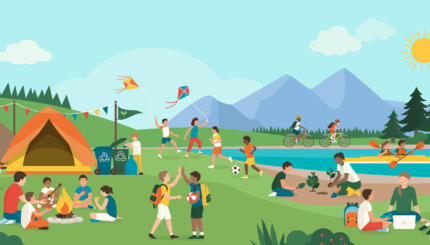As we begin this new year, and the coldest months are still in front of us, I want to share with you a piece of my journey this year, and a personal moment of transformation. A moment which I could hear my ancestors, both my African and Eastern-European roots, singing along with me.
This past summer I took a trip to Rwanda with JDC Entwine, the 20s-30s platform for the American Jewish Joint Distribution Committee (JDC). Though I visited Ethiopia in 2013, in a Divine and strange kind of way, this trip was different. I felt as if I was coming home; as if my DNA knew I was now on the continent of my origin, my bones, my heartbeat.
Arriving in Rwanda, I felt like biblical Jacob at the ladder, “not knowing the greatness of this place” until I had already been swooped up by the place and people. From the beautiful scenery and Banana-peddlers, to the monuments memorializing the dark past from the 1994 Genocide in their country, I was struck by the people, their strength and relentless desire to build a world from love, for their nation’s future, and to honor a dream that could never be realized by their nation’s past. I first understood the strength of the Rwandan people, of envisioning a humanity built upon courage, respect and Divine worth, at the Agahozo-Shalom Youth Village (ASYV) in the East Province of Rwanda.
The village was started in response to the Rwandan Genocide by Anne Heyman, a Jewish woman from Long Island. Knowing first hand about the Holocaust, Anne thought about the millions of orphaned children from her Long Island home and did something about it. Two-decades later, this one woman has changed the lives of thousands and inspired a country. Hand-in-hand with the help of the Joint Distribution Committee Anne purchased over one-hundred acres of land and started the Agahozo Shalom Youth Village, deliberately including the Jewish word for Peace, Shalom. The Village functions as a school and home, offering everything a Western family model would assume and an African family could only dream of: shelter, clean water, food, electricity, clothing, education and family. Students come on full scholarship. The only thing they need to do is pay for a bus to and from the village at the end of their studies and dream big, as the Village motto suggests “If you see far, you will go far.”
Today, no longer directly responding to victims of the genocide, ASYV is home to 600 orphaned teenagers who are seeking education knowing full well “knowledge is power.” When being accepted to the school the students are assigned to “families.” Each night they have an hour of “family time” set in place with the goal of offering support, life skills and accountability to one another. Their “mommas” are widowed women from the genocide, their “big brother/sister,” are students who graduated through the village’s school years prior, and their “cousins,” are cohorts of English-speaking foreigners who stay for 1-2 years at a time, and finally, the “guests” are people like me, like us. It was during this daily ritual of “family time” that I realized the power of Africa and Her people, and it was in those moments that I could hear by ancestors singing.
Each night I would bring my guitar with me to family time. I have had the privilege of traveling to nearly a dozen countries with my guitar, and throughout my travels, I’ve learned firsthand that music opens the hearts of the closed, confused or jaded, and elevates those who seek to be or never intended to be–not to mention any weariness of foreigners seems to absolve with the playing of every note. Knowing a moment like this would present itself, I prepared. For students struggling with English, I took one of favorite Jewish songs, typically sung in English and Hebrew, and translated it into Kinyarwanda-their spoken language.
My heart told me, for a village of orphans who have more grit than any teenager (or adult, for that matter) I’ve ever met, there is one message that I knew would resonate: “The whole entire world, is a very narrow bridge, but the main thing is not to fear at all.” A message greater than the tallest skyscraper: “have no fear at all.” And so each night we sang these words, louder and louder. We sang these words at breakfast, lunch and dinner, at family time and in front of the entire village. In the heart of Rwanda, Rebbe Nachman’s historic words along with the voices of every Jew I ever met was present with my African brothers and sisters “Lo L’fached Klal | Have no fear at all.”
As we begin this new year, a year filled with so many doubts about our humanity, I reflect upon my year and my time in Rwanda, and I am humbled and ennobled by the lessons these people have taught me. I am small and big. I am grateful. I am hopeful. Happy New Years!
As a rabbi, activist, and song leader, I am grateful for the opportunities I have had this year, and am humbled consistently by the people I meet and the dreams that people are relentless to see a reality. My colleagues would attest, there are difficult moments in the rabbinate. Ones filled with a sense of loss, of pain and of darkness, as is the human experience. However, with all of those difficult moments, they pale in significance, to the moments where “humanity meets God.”



